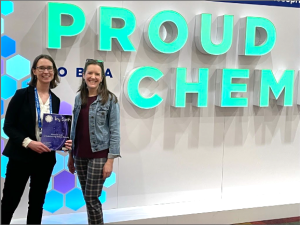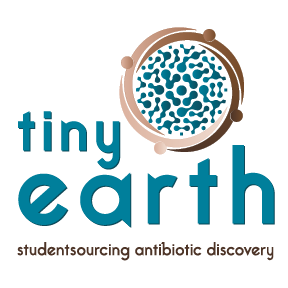
Dr. Kristin Labby (left) and Dr. Katherine Maloney (right)
How do we know what chemical compounds are causing the antibiotic activity in the isolates Tiny Earthlings find? What can they do after extracting the molecules and testing them for activity? These are questions that the Tiny Earth Chemistry Hub strives to tackle. While Tiny Earth “classic” curriculum aligns with the learning objectives of a microbiology or biology course, understanding the chemistry of antimicrobial molecules produced by soil bacteria is also essential to finding new antibiotics. The Tiny Earth Chemistry Course, which launches this month, was developed to bridge the gap between microbiology and chemistry.
Two Tiny Earth Partner Instructors (TEPIs), Dr. Kristin Labby and Dr. Katherine Maloney, joined forces to design and disseminate Tiny Earth Chemistry curriulum. The course, which uses techniques found in natural products chemistry, follows the same type of student-guided discovery emblematic of the microbiology-based Tiny Earth curriculum and expands it to encompass the expression and biosynthesis of antibiotics. The course is also designed to provide fun and stimulating activities while engaging students in relevant, authentic chemistry research.
Excited by the prospect of a drug discovery CURE (course-based undergraduate research experience), Dr. Labby and Dr. Maloney became TEPIs in 2019 and 2020, respectively. Tiny Earth Executive Director, Sarah Miller, led a team of chemistry-interested TEPIs through a course design process, called the Wisconsin Scientific Teaching Design Institute in January 2020. These principles were in embedded in the TEPI Training. This facilitated process resulted in the production of course goals and learning objectives, an outline of the course map, and prototype AJEDI content. Over the next few months, led by Dr. Maloney, a lean team of TEPIs including Dr. Labby, completed the course map. Dr. Maloney taught the course in 2020, pivoting online in August due to the pandemic. Dr. Labby adapted several pieces, first teaching it in Spring 2021.
Dr. Kristin Labby is an Associate Professor of chemistry at Beloit College, where she has taught since 2014. She completed her B.S. degrees in chemistry and biochemistry in 2007, after which she obtained her Ph.D. in chemistry, with a focus on medicinal chemistry, from Northwestern University in 2012. Dr. Katherine Maloney completed her B.S. in chemistry at Pacific Lutheran University in 2000 and her PhD in organic chemistry at Cornell University in 2006. She is now a Professor of chemistry at Point Loma Nazarene University. Throughout the development of the course, Dr. Labby and Dr. Maloney have brought their expertise together to develop excellent research experiences for Tiny Earth students.
Students who complete the Tiny Earth Chemistry Course have the opportunity to explore the chemical and physical properties of microbes in the context of antibiotic discovery while also learning about the ethical considerations involved. The course includes all the protocols and content you would expect to see in an introductory chemistry course, but part of its brilliance lies in the inclusion of AJEDI (antiracism, justice, equity, diversity, and inclusion) content. The first chapter addresses the ethics of bioprospecting and equity as well as justice in scientific discovery.
“Part of why I’m a teacher at a small college is because I want diverse students to experience and enjoy science. The structure of Tiny Earth classes and the network helps support that.” —Dr. Kristin Labby
Both TEPIs agree that seeing every part of the course, from the writing to the figures to the design, come together has been one of the most rewarding parts of the project. Getting feedback from other instructors has also been extremely beneficial as it helped them fill in the gaps in the course where their expertise did not match the course content. Of all apsects of the course’s development, the most rewarding has been the knowledge that the course they are creating will be used to help students learn chemistry, conduct research, and in the grand scheme of things, accelerate the antibiotic discovery pipeline.
“It was pretty exciting, when teaching the course, the enthusiasm that some students had. I don’t see that in the traditional chemistry labs that we do.” —Dr. Katherine Maloney
Dr. Labby particularly enjoys teaching Tiny Earth, because it is student-focused—giving students the opportunity to work independently as well as collaboratively and providing opportunities for further exploration of the material through webinars and symposia. Dr. Maloney especially enjoys being able to collaborate with other TEPIs and incorporate their experiences with teaching into the development of the Chemistry Course materials. Both TEPIs value the flexibility of teaching Tiny Earth in different formats.
The future of chemistry in Tiny Earth is bright, and the Tiny Earth Chemistry Course lays the foundation for redesigning the Tiny Earth Classic Course starting in the fall. Both Dr. Labby and Dr. Maloney have the goal of connecting chemistry with microbiology and hope that the course is not only useful for instructors teaching Tiny Earth but also for students who want to delve deeper into the chemistry of natural product discovery, topics not often covered in the undergraduate chemistry curriculum!
Thank you, Dr. Kristin Labby and Dr. Katherine Maloney for your amazing work!
What TEPIs can do:
- Check out the Tiny Earth Chemistry Curriculum on the TEPI Website.
- Reach out to Kristin Labby (labbyk@beloit.edu) or Katherine Maloney (katherinemaloney@pointloma.edu) for more information or to provide feedback.
- Try teaching the course to yourself or enlist a chemistry colleague to go through TEPI training.
- Join the Tiny Earth Classic revamp efforts this fall by filling out this form to express interest.
Written by: Melis Baskaya, Tiny Earth Communications and Media Intern

